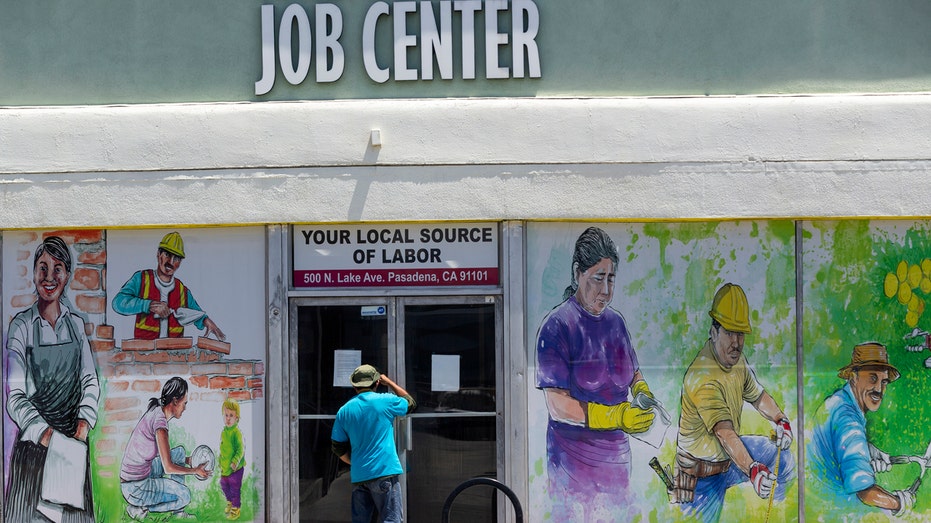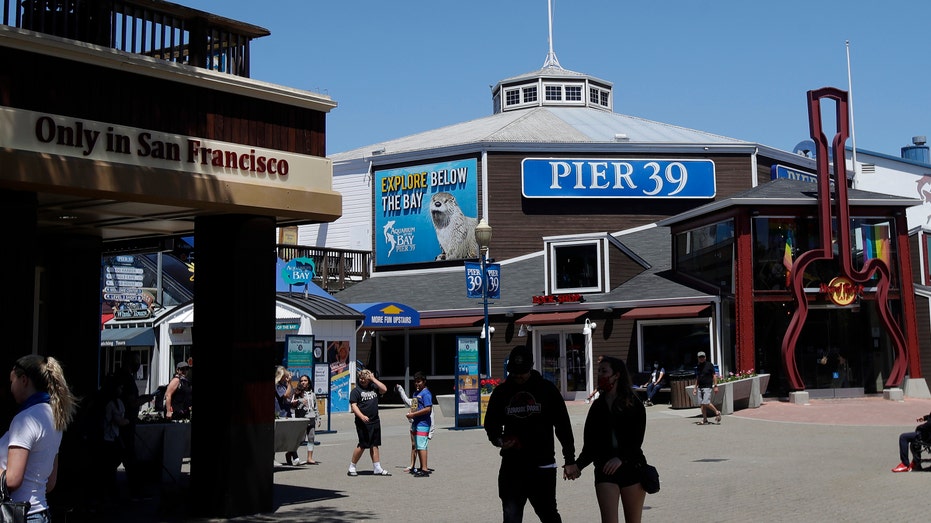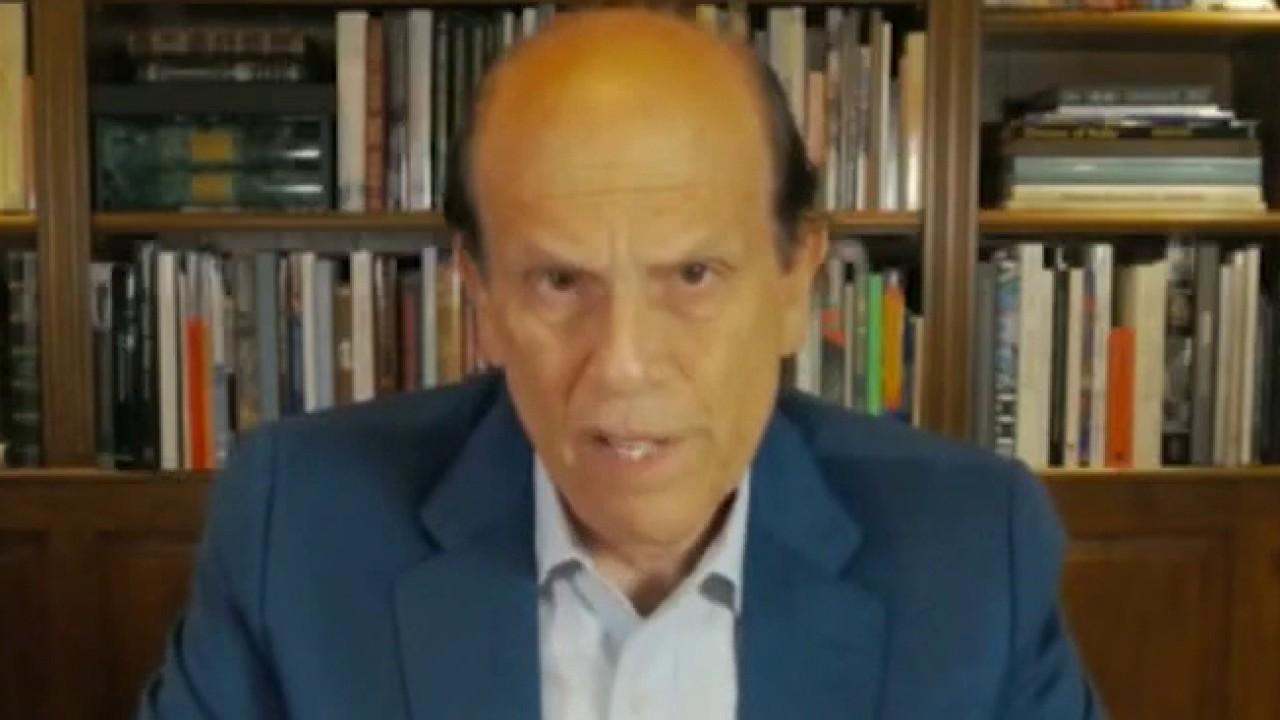In Los Angeles, an economy built on freelancers crumbles
Performers, production crews, ride-share drivers and personal trainers have also been hit hard
Candy Ibarra had six jobs at the beginning of 2020. Now she has none.
By March, with a pandemic-stricken economy in free fall, a Target commercial in which she was going to perform was canceled, as were at least six other Hollywood projects. Non-acting jobs she had to help pay the bills, as a private investigator and a translator, dried up because of travel restrictions and bans on outsiders in courts and hospitals.
In recent weeks some translation work has restarted virtually and she has explored customer-service work, but it pays only $9 an hour.

In this May 7, 2020 file photo, a person looks inside the closed doors of the Pasadena Community Job Center in Pasadena, Calif., during the coronavirus outbreak. (AP Photo/Damian Dovarganes, File) (Associated Press)
“It’s piddlings,” the single mother in her 40s said. “It’s just really hard to stay hopeful.”
Creative freelancers—with little job protection and incomes reliant on people leaving their homes—have been some of the hardest hit in the coronavirus-driven recession, according to economists. Performers, production crews, ride-share drivers and personal trainers were among the first to lose work and will likely be among the last to regain lost ground in the coming months, experts say.
WE NEED TO GET CAPITAL INTO COMMUNITIES OF COLOR: MICHAEL MILKEN
“These freelancers, they suffer more because they can’t rely on the big corporation to protect (them),” said William Yu, an economist at the UCLA Anderson School of Management.
That is particularly bad news for Los Angeles, which has the country’s second-highest concentration of high-skilled creative freelancers after Nashville, according to an analysis from Fiverr International Ltd., which runs a website connecting freelancers and employers. L.A. had the sixth highest unemployment rate among major metropolitan areas in April, according to the most recent update from the U.S. Bureau of Labor Statistics. State figures for May put Los Angeles-area unemployment at nearly 21%.
Some freelancers in L.A. say they are thinking of leaving entirely, raising questions about the future of a city long full of creative workers who pay the bills with second, third, and fourth jobs.
Nashville and New York, the other cities with highest concentrations of creative freelancers, are also outpacing national unemployment.

People visit Pier 39, where some stores, restaurants and attractions have reopened, during the coronavirus outbreak in San Francisco, Thursday, June 18, 2020. (AP Photo/Jeff Chiu)
The San Francisco Bay Area and San Diego have high concentrations of freelancers, too, but many work in technology jobs like software development that have been largely unaffected by social-distancing restrictions, economists said.
Workers say the freelance market is flooded with people who have lost jobs and that employers are asking them to do more for lower pay—or just to pitch their services—because competition is so fierce. Profiles for Los Angeles-based freelancers doing music, audio and video-editing work nearly doubled on Fiverr between February and March, the company said.
The federal emergency aid package from March gives state unemployment programs latitude to pay freelancers and gig workers unemployment benefits. California is giving them roughly the same as those with full-time jobs, up to $450 a week, through the end of the year. An added federal boost to those payments, $600 a week, ends in the last week of July.
The trouble for those workers has been part of a wave crashing the Los Angeles region’s economy. Along with film and the arts, it is driven by hospitality, high-tech manufacturing and international trade, all industries devastated by the pandemic and likely slow to return, according to economists.
Its unemployment has far outpaced other California cities.
The number of coronavirus infections in Los Angeles has been rising sharply. There have been just over 100,000 cases of Covid-19 in the county, according to the department of health, the second most in the nation behind New York City.
On June 12, Los Angeles County allowed several types of businesses to reopen, including film and TV production, hotels, gyms, museums and zoos. But that move came with new capacity restrictions and cleaning rules that freelancers say make doing business difficult.
Fitness coach Sophia Dalton, 37, said none of her clients are willing to train in person at the gym she uses in Santa Monica, which has reopened, due to fear of catching Covid-19.
She is down to 14 clients training by online video from a peak of 54. Several who quit are writers and performers who lost their own jobs and asked for refunds.
CLICK HERE TO READ MORE ON FOX BUSINESS
“I feel kind of pushed out, and like we’re never going to be able to get back in,” she said.
Stephanie Hoffman, 32 years old, a voice and piano teacher, lost most of her students when the pandemic forced people to stay home. One third have returned, but she fears they won’t stick, due to frustrations with virtual training. She had to cancel a live recital for her students, further damping their motivation.
Her savings and federal assistance have helped cover rent, but she has been denied extended unemployment benefits so far and will soon face a financial reckoning.
GET FOX BUSINESS ON THE GO BY CLICKING HERE
The stress is building. Some nights she doesn’t sleep. She has been having back pain and tightening neck muscles, bad for a singer. She says she can hear her voice deteriorating.
Her younger sister is an actress and already left the apartment they shared to move in with their parents after losing her job, Ms. Hoffman said. They have near-daily, often tearful, phone calls in which Ms. Hoffman says she tries to cheer her sister up and avoids talking about her own future.




















